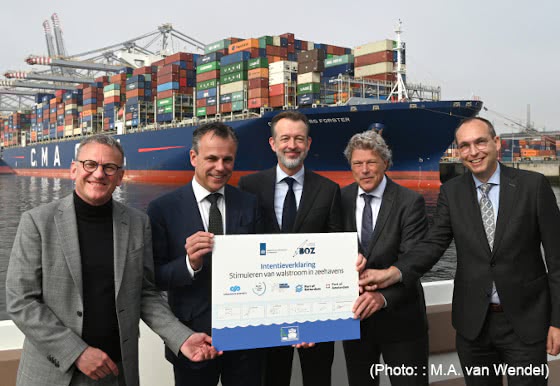
In the next few years the Dutch Ministry of Infrastructure will allocate 140 million euros to help install cold ironing plants at national ports in order to allow ships at berth in the scallops to switch off their engines. onboard and to tie up to the ground power grid. In addition to this figure, another 40 million euros coming from the Climate Fund will be allocated for this purpose.
The commitment to this effect by the government of Amsterdam was formalized yesterday by the Minister for Infrastructure and Water Management, Mark Harbers, who signed a letter of intent with the Branche Organisatie Zeehavens (BOZ), the body that makes up the point of contact between representatives of the economic-port industry with the government administration, in which the public-private agreements for the implementation of the power systems of ships with the energy from the ground are defined.
The parties highlighted that, with the forthcoming new European Regulation on Alternative Fuels Infrastructure (AFIR), from 2030 European ports will be obliged to supply electricity from the ground network to so-called AFIR vessels, namely to container ships, cruise ships, other passenger ships and ships for the transport of passengers and cargo of the gross tonnage of at least 5,000 tons, ships that generally consume a lot of energy on the quay.
The agreement stipulates that the resources to equip the ports of cold ironing plants will be mainly targeted at the terminals where they dock at AFIR vessels, although it is expected that other projects will also be eligible for subsidies.
The BOZ has calculated that in the next few years it will have to be installed in Dutch ports about 270 megawatts of power supply from land for AFIR vessels to meet the expected obligation introduced at the European level, with an investment needed of more than 300 million euros. The chairman of the Branche Organisatie Zeehavens, Boudewijn Siemons, highlighted that " with the proposed grant scheme, the Ministry of Infrastructure and Water Management and BOZ have called out attractive basic conditions for immediate installation of power from the ground, in anticipation of the mandatory introduction at European level by 2030 ".
"I am pleased that with this subsidy scheme we can offer a helping hand to the sector and further stimulate the installation of electricity systems from the ground up," Harbers said. This leads not only to environmental benefits, but also to less noisy generators that work while a ship is moored. " 
